Oscar Hillerstrom: I’m going to ask one more question – I think we need to talk about the singing. Because the first thing that snapped this film away from the normal action hero movies was the first trailer which had Dwarves singing, and I think that’s a bold move. But I wanted to know, from your perspective – you were a song and dance man before you went into the more serious side of drama – what was it like to actually sing ‘in camera’ (so to speak) with the other Dwarves?
Richard Armitage: I did a production of The Hobbit when I was 13 – which was a musical really. So I knew that Tolkien had written loads of songs so I was very excited that they were going to put this song in. Fran Walsh wrote the theme, Fran is Peter’s partner and writing partner, and she wrote the tune. So I was very honoured to have been asked to take the first line of that song. I didn’t want him to sound like a singer, so I listened to a lot of Russian Church music, I listened to a male Welsh Voice Choir, and I worked with a pianist and we slowly took the pitch down and down till we got to a point where it sounded as Tolkien was describing it – which was the deep throated sound of the singing of the Dwarves.
Then we went into a studio and recorded it a number of times. I wanted to keep recording it until the end of time because I was not ever happy with it. But yes, I think it was one of those moments that they didn’t know what that song was going to sound like, and when obviously all of the men and the boys, the other Dwarves, the blend of sound sounded so beautiful that they just decided to use it in the Trailer.
Oscar Hillerstrom: Now Ladies and Gentlemen it’s your turn so … we’ll start over here.
Audience Question: They’ve done a great job making the horses look like Dartmoor Ponies. What were the horses like to work with? They seemed far less grumpy than actual ponies.
Richard Armitage: I loved my horse – my horse was called Sharmon. She and I became very close. I used to go out riding with Jed Brophy (Nori) on weekends. When we were on location we used to go and visit the horses and take them out. Tolkien describes Dwarves as not liking the horses, they don’t ride very well. Which I get slightly annoyed about because obviously I was totally in love with my horse. And yeah, they had some hairy costumes on which Sharmon didn’t like. She used to try and shake that woolly coat off.
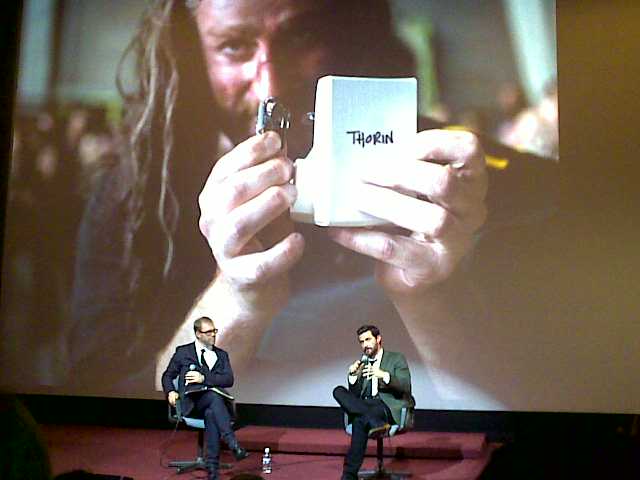 Audience Question: How much input did you and the other Dwarves have with the final Dwarf looks?
Audience Question: How much input did you and the other Dwarves have with the final Dwarf looks?
Richard Armitage: The whole process working with Peter and his team was collaborative. At every stage my opinion was valued – down to the shape on the body, the fit, the shape of the costume, the length of the costume, the length of the hair. I remember asking for more grey at the sides because I felt that it would really give him more age. And I wanted that pelt (the fur pelt) – because I originally conceived Thorin as being like a Bison, and I wanted that upper body bulk. Whenever I didn’t have that fur on I really felt that I was sort of missing a part of him. So, as much as it was hot and heavy, they would always say ‘you can do this scene without the pelt if you want to’ and I would be like ‘no, no, I need it, I like it, it makes me feel like the character’.
Audience Question: Did you ever record a full version of The Misty Mountain song, because it’s so short?
Richard Armitage: You’re about to see the film. And it (the song) is quite long. If that song could have been any longer I think people would have got a bit impatient. (laughter) But there was a moment where I nearly got to sing the song at the end. Yeah. But I thought it may not be appropriate for all of the characters in the scene, but that was the full version of the song in the movie. Neil Finn did a version of the final song which he extended and wrote and developed, which I absolutely love. But I’m hoping there will be more singing in movies 2 & 3.
Audience Question: Can you talk about the way in which you, as a child, imagined Thorin to be as compared to the role you created after Peters vision?
Richard Armitage: Yeah its very interesting because I was trying to listen to both those voices because I do remember very clearly reading the book as a 12 year old, and then as a slightly older than 12 year old. As a kid I focused very much on Bilbo and then as an adult I was focussing on Thorin. But I had seen him probably as a bit older, but it was important that he was a potential King. That he was somebody who could return to his throne and lead his people and show his prowess on the Battlefield. So I think we found a place which was older than I am but he still had the youth to be able to swing that sword around and really fight for ‘his people’ which was important.
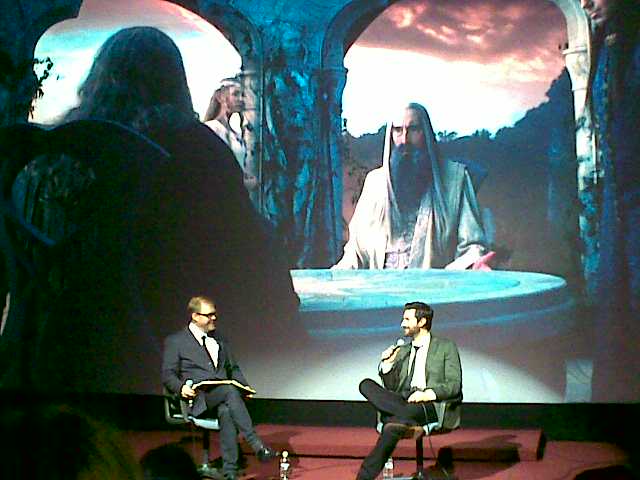 Audience Question: There a lot of Urban legends about working with Christopher Lee. How was your experience with working with him?
Audience Question: There a lot of Urban legends about working with Christopher Lee. How was your experience with working with him?
Richard Armitage: I hate to disappoint you but I never met Christopher Lee. Sadly. (audience gasp) Well I don’t like giving away too many secrets about filming but, all of Christopher’s stuff was shot in the UK because he was too old to travel. Yeah, so I never got to meet him sadly.
Audience Question: If you hadn’t have been cast as Thorin, who would you have liked to have been cast as?
Richard Armitage: Umm, you tell me (smiles). Actually one of my favourite characters in the book is Beorn, so I would have liked to have had a crack at him. But you wait until you see Mikael Persbrandt – it’s an incredible performance – and he really lives up to that image that I had as a kid. Yeah, he’s one of my favourite characters.
Audience Question: This person had a bit of difficulty with the question, but Oscar helped out by rewording the question for them: What was it like to feel like watching yourself in a movie?
Richard Armitage: It was really surprising. I had actually thought that I hadn’t done very much in the first movie. I thought all my stuff is in movies 2 & 3. So when I saw the first film I was shocked. I just didn’t realize what Peter had been doing; I didn’t realize the shots that he’d choose. Um, I was obviously quite pleased. Because he made Thorin look pretty awesome – that’s his work mainly, not mine.
Audience Question: Could you tell us how Peter Jackson as a Director gets a performance out of an Actor?
Richard Armitage: It was always very difficult to get Peter to sit down before you went onto set to talk about the character, or the process or the story. He actually likes to have a conversation while the camera is rolling, so the whole thing feels like an experiment. He loves it when you develop an idea and he’ll go with you. It takes a while for you to find that path together. But one of the things he does which I absolutely love is that he’ll use another actor to get the performance out of somebody, so he doesn’t necessarily come to you and say I want this response. He’ll take an actor away that you’re going to work with. And I had a moment in movie 3 – which I can’t talk about – with Martin where I was in the middle of a scene and he took Martin away, and I didn’t know that he’d done this. And Martin came back and played something to me which got quite an extraordinary response from me that I had not predicted – and that was the take. And that’s actually what he (PJ) does. And he did it to me as well. I had a scene with Kili and he (PJ) took me aside and said ‘I want you to say this, I want you to do this’ and we got the response from Aidan. And I say this; it’s such a great piece of work you just don’t know that he’s having an effect on you.
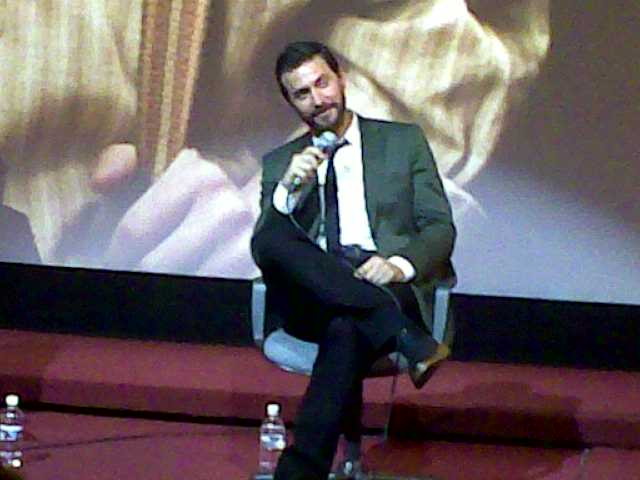 Audience Question: From an Actors perspective can you tell me what you learnt that was different when doing something as massive as The Hobbit as opposed to doing TV series (like Spooks), and which do you prefer?
Audience Question: From an Actors perspective can you tell me what you learnt that was different when doing something as massive as The Hobbit as opposed to doing TV series (like Spooks), and which do you prefer?
Richard Armitage: The main thing really is time. When you’ve got a budget like we have for The Hobbit it buys you so much time. Because in television you do 3 or 4 takes and you move on – there’s this urgency to shoot. I mean don’t get me wrong, if there was an urgency we’d shoot, but there was time to experiment and really that’s what I’m talking about in regards to the last question. But also to work on a green screen – which I’d never done before – I was nervous of it, but in fact what it does it fires up your imagination and like, I come from a theatre background so it was tapping into a lot of old things that I had forgotten about – all the things you have to imagine – so I really enjoyed that aspect of it.
Audience Question: What elements of Thorin’s character can you relate to the most? And do you have any life experiences that helped to shape your portrayal of Thorin?
Richard Armitage: I suppose the thing I loved about Thorin really, is because he does have a fear of what he’s going to do, he is stepping into the unknown, he’s bound on a path towards something which is both thrilling – he will get to be a King and he will accumulate a huge amount of wealth. But at the same time in that Mountain is the most terrifying thing that he’s ever experienced and it’s like he has experienced it – The Dragon. Really I assimilated that with or to a holocaust of some kind. But, I mean I was using the bomb on Hiroshima – the extraordinary devastation that caused. So he’s experienced that. So I think that that’s the thing that I was most fascinated with – he’s walking towards something that he wants but at the same time its repelling him. That kind of dichotomy was the most interesting thing – and I feel like that in my own career.
Audience Question: Of all the stunts you were legally allowed to do what was your favourite stunt?
Richard Armitage: My favourite stunt was one that I didn’t know I was going to be able to do. I watched my stunt double do it, he was absolutely brilliant and it was this scene where – it was actually an additional scene we were in pickups, when we were on the Mountain where the Stone Giants are fighting and Bilbo falls of the side and Thorin climbs down and then falls. And we were doing that on wire and my stunt double came to me and said ‘I think you can do this’ and I was like ‘OK if you think I can do this then I’ll do it’. So just getting on a wire and doing something that you’ve summed up as already shocked is thrilling but you know, I love doing as many of the stunts as possible. Not because it gives you a sense of heroism but it makes you really feel like you’re playing the character if you get to do everything that the character does it’s just very satisfying.
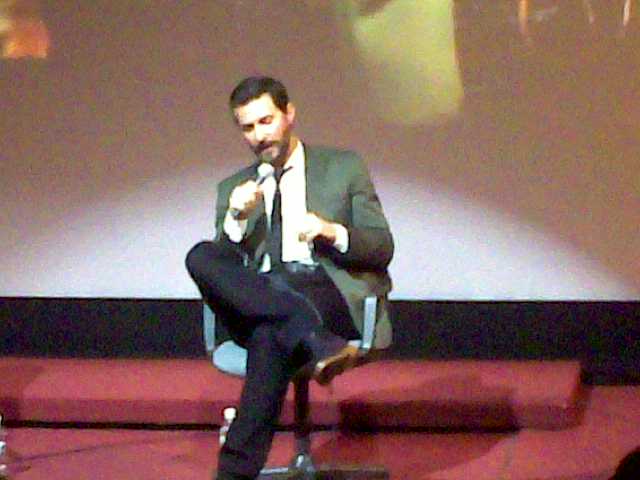 Audience Question: You’re a method actor and you immerse yourself in your characters – was that more difficult or easier to do when you had to have so much make-up and use Green screens?
Audience Question: You’re a method actor and you immerse yourself in your characters – was that more difficult or easier to do when you had to have so much make-up and use Green screens?
Richard Armitage: It was kind of essential actually. A lot of the discomfort of the costume and prosthetic was alleviated by just staying focused on the character. But also the way Pete works is sometimes he’ll just call on you with half a minute to prepare and you have to dive straight into something, so it was very hard to take my mind off things and gauge too much. Although Dwalin and I did have a lot of games of table tennis on G stage – but apart from that …
Audience Question: You’ve played a lot of dark brooding grumpy characters. (laughter) – I wonder if you could comment on what your experience is of ‘casting to type’ and your experience on that especially in the US and the UK, and whether you’re looking forward to choosing some different sorts of roles in the future?
Richard Armitage: That’s a very good question. I always get very nervous when I read something that I feel is close to myself, because I predict that I won’t get it. Because I’m better at being somebody who is very far away from myself I think. But of course I fantasize about playing the romantic lead and the heroic character I just don’t think my face suits that – I think there’s just something … (laughter)
Oscar Hillerstrom: Yes I think you’re right – you do look inherently evil. (laughter)
Audience Question: Peter is renowned for his high tech approach. Were you expecting to work with such a high quality technology?
Richard Armitage: You know, when you’re shooting it you’re really not aware of any kind of technological differences between cameras apart from the fact with digital you can do what’s called ‘rolling research’ which I think is something that Peter uses himself whereby you don’t cut camera you just keep going and you go again immediately and for an Actor that’s an absolute gift because you don’t have time to think about it or over think it or self-note or analyse so it’s very freeing. The only thing that was a struggle and a bit of a challenge was to get the scale issue right. Pete developed a technique called ‘slate motion control’ – where some Actors are in a Greenroom, some are on a scale set and the two cameras are coordinated. I think I have a scene in the second movie – which I’m not allowed to talk about – whereby there were 300 people on set and I was alone in a Greenroom with 25 eye lines – little crosses on the wall. But then again you try to find something in your imagination. You go back to the main set and you rehearse again and you take that feeling away with you and just shoot the movie. So yeah, it was challenging.
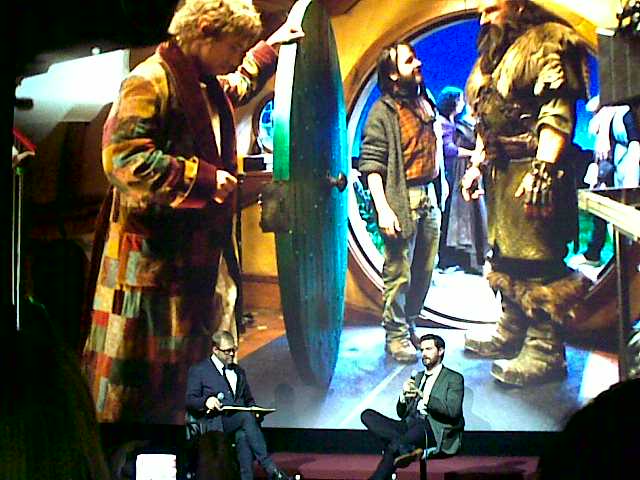 Audience Question: Was it a hard to live up to Thorin’s character seeing that Thorin had so much heavy history and backstory; losing his whole kingdom and his father?
Audience Question: Was it a hard to live up to Thorin’s character seeing that Thorin had so much heavy history and backstory; losing his whole kingdom and his father?
Richard Armitage: It was one of the best parts of the character actually because Tolkien did write about that story in the Appendices which we were allowed to use as Thorin’s reference. I mean I love to write the biography for the character so I used all of that and then added some things myself that I felt would help me because I knew we were going to do a prologue so I tried to imagine what happened on that day when the Dragon came so that when that character opens the door to the Mountain, and smells the air it has such a sense of memory for him of what happened to him as a child that all of these things as much as they burn him they drive him forward so it was one of the best reasons to play the role.
Audience Question: What was it like filming scene 88 the wall chase. Dean, Steven and Graham mentioned that it was really full-on. What was it like for you?
Richard Armitage: Scene 88 was a chase sequence – it felt like we had run throughout the whole of the North and the South Island. But it was so great to be out in those incredible locations. Places that I had never seen in my life and probably never will again. But I do remember every day strapping up my ankles with tape because the ground was so uneven that you could really twist your ankle and obviously you can’t have a limping Thorin in the front of the scene so…no, it was a challenge.
Oscar Hillerstrom: Now Richard obviously Andy Serkis’ work has been ground breaking and he got to work with Martin Freeman, but there’s another character who I can imagine you wouldn’t think would be working in a motion capture situation and that is the character played by Benedict Cumberbatch. And the thought occurred to me that it’s quite possible that Peter Jackson would get Smaug and you in the room together – and I’m just wondering whether that’s happened or whether you’ve actually talked about it.
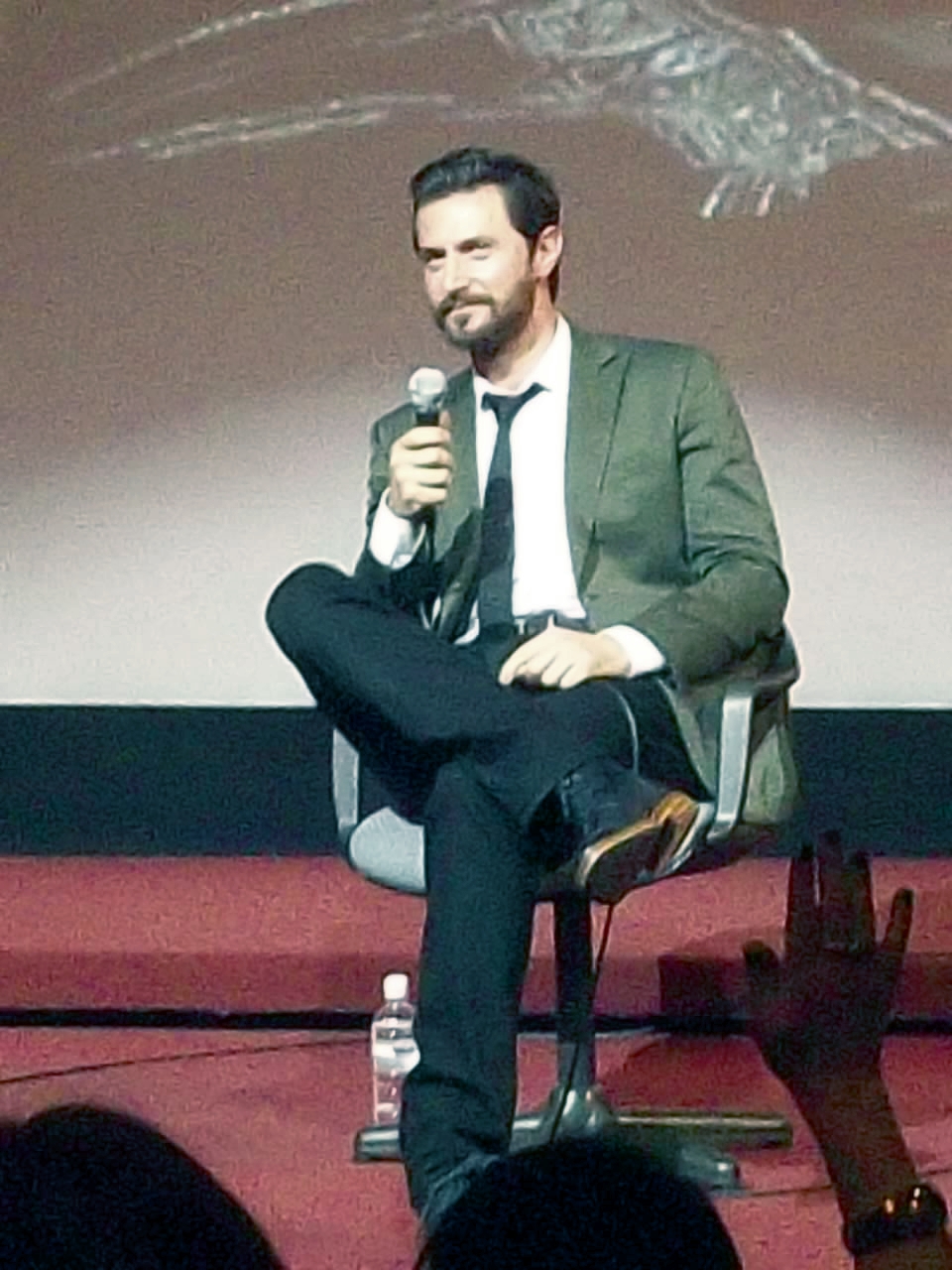 Richard Armitage: That’s a big spoiler (laughter). I went into the motion capture studio because I wanted to see how Benedict worked and I’m a huge fan of his, so we did cross paths. I love the fact that they’ve cast him because it means that the Dragon has incredible intellect and an incredible voice. I also think that they may be able to use certain aspects of his bone structure in the face of the Dragon but nobody knows yet. But I don’t know if Thorin and Smaug ever come face to face. That’s something I’ll find out when we go back to do reshoots. I hope so.
Richard Armitage: That’s a big spoiler (laughter). I went into the motion capture studio because I wanted to see how Benedict worked and I’m a huge fan of his, so we did cross paths. I love the fact that they’ve cast him because it means that the Dragon has incredible intellect and an incredible voice. I also think that they may be able to use certain aspects of his bone structure in the face of the Dragon but nobody knows yet. But I don’t know if Thorin and Smaug ever come face to face. That’s something I’ll find out when we go back to do reshoots. I hope so.
Oscar Hillerstrom: And finally I’d like to – something that’s been touched on in a few questions – I think it summed up in the fact that you worked with the Appendices and you went back to the original material and you were influenced by Tolkien, and many fans you inspired by Tolkien now see you come to life is one thing, but I’m wondering; What would you ask him about your character and this story if you could?
Richard Armitage: The one thing I would want know and it’s something I try to fill in in my little biography was ‘Who was the love of his life?’ Because I felt that he sacrificed his life, all that he has given up for his people, for his quest, and I did imagine that there might have been a Princess that he would have been betrothed to as King under The Mountain. So perhaps that’s probably what I’d ask Tolkien.
Oscar Hillerstrom: well Ladies and Gentleman, I think that sums it up! Richard Armitage in a nutshell – a class act! Thank-you everyone. Goodnight.
This was the end of the Q&A and Richards’s appearance for the evening. The audience stood to their feet and cheered and clapped as he left the stage.
After this the audience was treated to a screening of The Hobbit.


